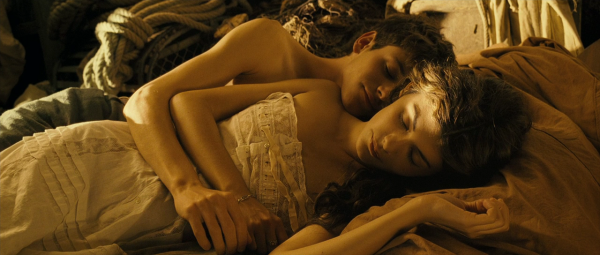Movie review by Greg Carlson
Jean-Pierre Jeunet’s films always burst at the seams with clever visuals and stunning design, even when they fail to deliver detailed, fully dimensional characters. “A Very Long Engagement” is the director’s latest concoction, and it snaps with Jeunet’s familiar cinematic zest, courtesy of a second pairing of the filmmaker with his “Amelie” muse Audrey Tautou. Based on the popular novel by Jean-Baptiste Rossi (writing as Sebastien Japrisot), “A Very Long Engagement” allows Jeunet to return to some of the dark themes he explored with former collaborator Marc Caro in excellent movies like “Delicatessen” and “The City of Lost Children.”
Dispensing with most of the quaint romantic fancy that guided “Amelie,” Jeunet takes creative refuge in the grim trenches and bloody battlefields of WW I. In one of his typically dizzying set-pieces, the director introduces a quintet of soldiers condemned for self-mutilation. Each of the five men sports a wounded or mangled hand, and Jeunet takes swift and savage delight in illustrating the circumstances of the gruesome injuries. One of the grunts is Manech (Gaspard Ulliel), a sensitive lighthouse-keeper’s son who interrupted his courtship with childhood sweetie Mathilde (Tautou) in order to serve in the French army.
Rather than execute the five court-martialed prisoners, a field officer instead sends them into no-man’s-land, a hellish stretch of scorched earth between the French and German lines, where it is assumed they will perish. Once the men are outside the barbed wire, Jeunet lets slip the dogs of war, and the ensuing carnage is an evocative homage to several masterful screen depictions of WW I, including Milestone’s “All Quiet On the Western Front” and Kubrick’s “Paths of Glory.” Mathilde, however, refuses to believe that Manech is dead, and pluckily sets out to track down every shred of evidence that will lead her to the truth.
Jeunet quickly adopts a puzzle-box strategy for the narrative, and Mathilde renews her hopefulness with each discovery and clue. Helped occasionally by a Parisian investigator (Jeunet regular Ticky Holgado), Mathilde reconstructs the stories of the five doomed soldiers, and in the process, we learn more and more about the often fascinating peacetime activities of the group. Jodie Foster shows up in one of these storylines, and plays out a tragic, immediately recognizable thread that has been used in other tales. The best of the side trips concerns the mysterious whore Tina Lombardi (Marion Cotillard, in a performance that makes you wish she had more scenes), a twisted killer out for revenge against the men she finds responsible for her lover’s death.
Lombardi’s own arc, which cleverly serves as a much needed counterpoint to Mathilde’s syrupy wholesomeness, ignites several sections of the movie. While many audience members might grow restless with Jeunet’s congested palette, which groans under the weight of too many peripheral characters and wheezy subplots, Cotillard’s Lombardi is wickedly entertaining. Dispatching her enemies with the kinds of elaborate mechanical devices that get Jeunet salivating, Lombardi could have been the central character in a movie of her own. As Mathilde’s vengeful doppelganger, Lombardi emerges as the most memorable element of the film.
